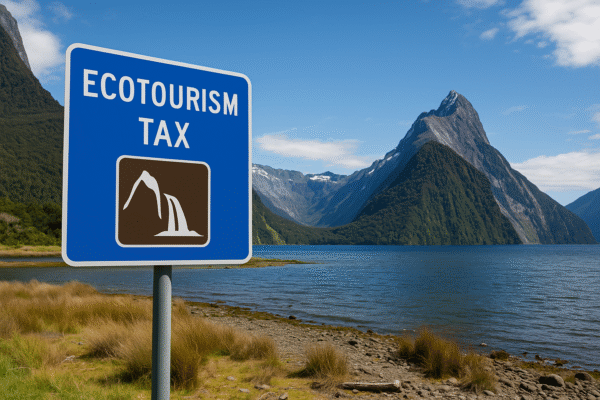In a landmark move for sustainable travel, New Zealand has announced plans to introduce a new eco-tourism tax starting in 2027. This tax will be applied to foreign visitors accessing the country’s world-renowned natural attractions such as Milford Sound in Fiordland National Park and the Tongariro Alpine Crossing. The tax is projected to range between US$20 to US$40 (approximately NZ$34 to NZ$68) per visitor.
This initiative aligns New Zealand with a growing coalition of environmentally-conscious nations—including the United States, France, Greece, Spain, Iceland, Japan, Portugal, and South Africa—which have implemented or are planning similar measures to safeguard their ecological treasures from the impacts of overtourism.
Why an Eco-Tourism Tax?
The rationale behind this eco-tax is twofold: to fund conservation efforts and to preserve New Zealand’s pristine landscapes for future generations. According to data from Tourism New Zealand and the Department of Conservation, the country attracts millions of international tourists annually, many of whom visit ecologically sensitive areas.
These influxes place immense pressure on natural ecosystems, leading to trail erosion, waste management issues, and disturbance to native wildlife. The estimated NZ$62 million that will be generated annually through this eco-tax will be invested into infrastructure maintenance, environmental restoration, and community engagement programs across protected sites.
Part of a Global Conservation Trend
This development follows similar policies rolled out globally:
- In the United States, national parks like Yosemite and Grand Canyon have increased entry fees for foreign tourists, with revenue channeled into infrastructure upgrades and preservation programs overseen by the National Park Service.
- South Africa’s conservation fee model, especially at Kruger National Park, supports anti-poaching units, wildlife monitoring, and local community livelihoods, ensuring biodiversity is protected while tourism flourishes.
- Iceland introduced accommodation and cruise taxes to preserve its fragile volcanic landscapes, including Vatnajökull Glacier and the Golden Circle. Funds help manage tourism and mitigate environmental degradation.
- Japan’s ‘Sayonara Tax’ of ¥1,000, imposed at departure, supports sustainable tourism infrastructure across cultural and natural sites like Mount Fuji and Kyoto’s temples.
- Portugal’s green fee, applied in regions such as Madeira and the Azores, is used for trail maintenance, marine conservation, and preserving UNESCO World Heritage sites.
- Spain’s eco-tax in tourist-heavy regions like the Balearic Islands finances beach restoration and waste management efforts.
- France uses its tourist taxes to support both city infrastructure and national park conservation, with destinations like the French Alps benefitting directly from these revenues.
- Greece imposes tiered hotel taxes to fund the upkeep of both cultural sites like Delphi and natural landmarks such as Santorini’s caldera cliffs.
New Zealand’s Unique Approach
While countries like Japan and Iceland apply eco-taxes across a broader tourism spectrum, New Zealand’s approach is targeted specifically at natural attractions with the highest foot traffic and ecological sensitivity.
The Milford Sound, known for its fjords, waterfalls, and rare marine life, and the Tongariro Crossing, one of the country’s most famous alpine hikes, will be initial pilot locations for this initiative. These areas have recorded tens of thousands of visitors annually, often exceeding the sustainable carrying capacity recommended by environmental experts.
Tourism Minister Peeni Henare has stated that the eco-tax is part of a “long-term vision to make New Zealand a global leader in sustainable tourism,” aligning with the Tiaki Promise—New Zealand’s official tourism sustainability framework encouraging visitors to care for land, people, and culture.
Public and Industry Reactions
The move has been largely welcomed by environmental groups, tourism operators, and local iwi (Māori tribes). While some in the tourism industry initially expressed concern over potential declines in visitor numbers, research indicates that eco-conscious travelers are increasingly willing to pay a premium for sustainable travel experiences.
A 2025 report by the World Travel & Tourism Council (WTTC) shows that 72% of global tourists consider environmental impact when planning trips, with growing support for initiatives that contribute directly to conservation.
Looking Ahead
New Zealand’s eco-tourism tax is not just a funding mechanism—it’s a statement of values, emphasizing the nation’s commitment to balancing tourism growth with environmental responsibility. By joining a global alliance of nations focused on eco-centric policies, New Zealand positions itself at the forefront of regenerative tourism.
This policy is expected to pave the way for enhanced visitor experiences, stronger partnerships with local communities, and better protection of New Zealand’s endemic species and sacred landscapes.
For travelers planning their 2027 and beyond adventures, this tax will be a small price to pay for the priceless privilege of experiencing Aotearoa’s natural beauty—responsibly.
For more travel news like this, keep reading Global Travel Wire

















